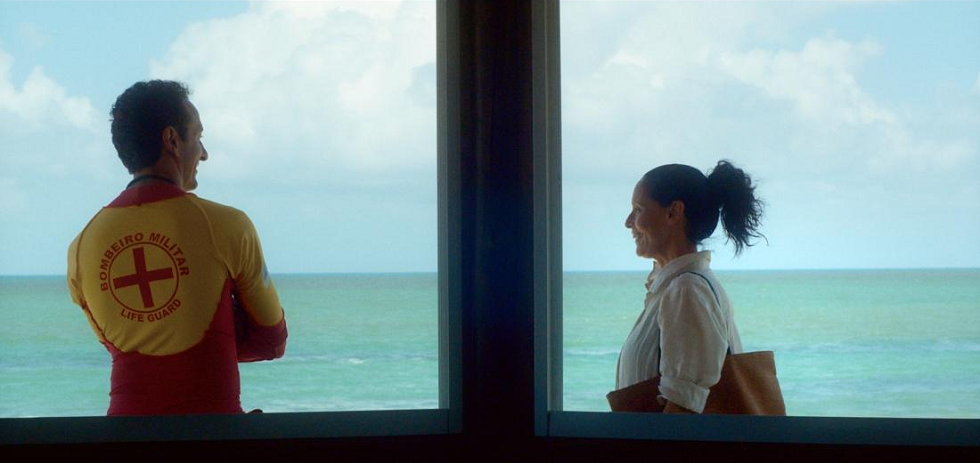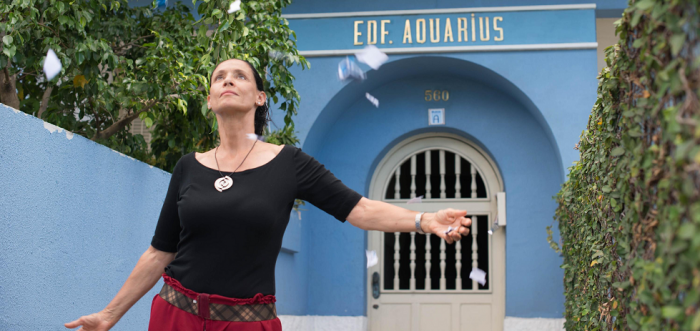
Kleber Mendonça Filho’s sophomore feature Aquarius begins in 1980 with a beguiling prologue set in the sparkling seafront city of Recife in Brazil’s northeast, which also housed his debut Neighbouring Sounds. We are introduced to Clara (Sonia Braga), a woman in her social prime, whose hair is black and tightly curled. Clara listens to Queen in her car while on the beach with her friends. The group attends a seventieth birthday party for Clara’s husband’s aunt. And like that, after just two extended scenes, the past is shed from the fabric of the film, and we are in Clara’s present-day apartment, as the now-grandmother and retiree stretches for her morning yoga routine. Many aspects of the prologue are never mentioned again — the aunt at the party remembers a passionate tryst in striking cutaways; Clara’s husband gives an emotive birthday speech but is barely remembered in the present day; Clara’s skin seems to lighten and her hair is no longer curly.
Mendonça’s seemingly incongruous opening encapsulates the journey on which Aquarius embarks. Rather than functioning as a straightforward character study, the film explores the imperceptible boundary between the past and the present, and more broadly between an individual and their society. It bursts with small moments of memory and mystery, while still telling a moving story of love, labour, and loss, mainly thanks to a considered and committed performance by Braga.
The film’s present-day plot is used primarily as a vehicle for its thematic concerns, and as such can be summarised in few words. Clara’s apartment in the Aquarius building is the last inhabited one — the rest have been bought out by developers who plan to capitalise on the site’s prime location, led by Diego (Humberto Carrão), a young engineer out to prove himself. Clara, whose identity is so strongly connected to her home, refuses to sell up, and the developers find ways to retaliate by making the building as inhospitable as possible. The eventual revelation that they purposefully infested the site with termites provides the climax of the surface plot, and enables Clara to gain a Pyrrhic moral victory even as her home is likely condemned.
Aquarius, though, is not truthfully about corporate greed. Clara is not Erin Brockovich, and Mendonça is not as interested in leading her story to a satisfying finale as he is in mining the spatial and temporal layers of her psyche. Cinematically, he eschews any consistent formal structure which could delineate places or periods of time, instead allowing Clara’s mood to define the film’s style. Early sequences establishing her status as a popular local figure, her daily routine of visits to the beach, and her ongoing relationships with her peers and family, are presented in crisp, bright clarity, with Braga able to play her character as wilful without being august, and as exuberant without becoming a cliché of the well-off older widow. As the film begins to explore the darker territory of urban decay, illness, and conflict, Mendonça’s camera starts to tighten on his characters, and his pacing begins to feel jagged and unpredictable. As Clara’s physical space — her home — begins to come under threat, the apartment is not framed in neat medium interior shots, but instead in constant reverse angles and off-centre compositions which make it impossible to understand Clara’s relative positioning in it.

Mendonça skilfully incorporates elements of visual metaphor into the plot to achieve this sense of unease and mystery. One memorable sequence, for example, shows Clara returning from a night out to see a giant piece of silvery netting hanging ethereally from the building next door. With no reference point beyond our protagonist’s subjective experience, we are unable to resolve the scene as either reality or metaphor. Is the city’s maritime heritage manifesting itself as a vision of a huge net capturing the workmen in the building like a shoal of fish? Is Clara seeing the swaying material and ruminating on the oddly organic quality of something being used for the unnatural processes of urban development? Or is it just a net, and our protagonist not truly a literate and embattled heroine but rather a posturing stick-in-the-mud?
The film takes a similarly liberal approach to understanding time, arguing forcefully that memories are inextricable from the true, present nature of a place. Clara’s internal battles with her own aging body (now missing a breast after a cancer bout), her undulating desire for romantic and sexual companionship, and her loving but no longer dependent adult children, are used to underline that her identity has been forged from experiences which deserve to be treated as equal to those occurring in the here and now.
If Aquarius has a message, it seems to be that the crime of those who would subjugate individuals’ desires in favour of progress is not necessarily mere callousness. It’s a lack of respect for the universality of experience: we’re all the only person we ever get to be, and living on our own terms is as strong a desire for one person as it is for another. Clara has become herself through a life well lived, in which love, death, Recife, Brazil, and a thousand other things have ebbed and waned and changed. Mendonça’s film, aided immeasurably by Braga’s performance, confirms his status as a perceptive chronicler of modern experience.
Aquarius is screening from February 23, 2017 at Cinema Nova in Melbourne.
Around the Staff
| Conor Bateman | |
| Jessica Ellicott | |
| Dominic Barlow | |
| Brad Mariano | |
| Luke Goodsell | |
| Ian Barr | |
| Jaymes Durante | |
| Tope Ogundare | |
| Virat Nehru |
